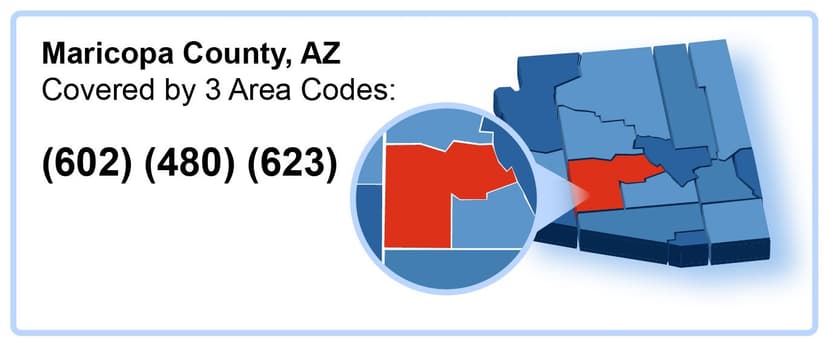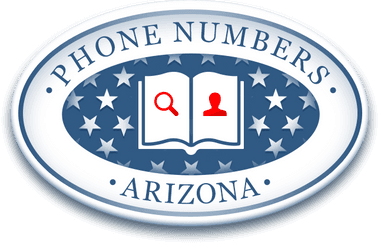What are Maricopa County Area Codes?

Area codes were introduced as part of the North American Numbering Plan (NANP) and consist of the first three digits of telephone numbers. An area code identifies a specific numbering plan area (NPA), as outlined by the NANP. The Arizona Corporation Commission implements and maintains area codes for Maricopa County.
There are currently three area codes that cover Maricopa County. These are:
Area Code 602
Area code 602 is an Arizona telephone area code covering most of the City of Phoenix in Maricopa County. It is one of the original area codes established by the NANP and covered all of Arizona until 1995.
Area Code 480
Area code 480 is an Arizona telephone area code that serves the eastern and northern sections of the Phoenix metropolitan area. It was created in 1999 in a split from area code 602. Locations in Maricopa County covered by this area code include Ahwatukee, Apache Junction, Chandler, Fountain Hills, Gilbert, Mesa, Paradise Valley, Queen Creek, Scottsdale, and Tempe.
Area Code 623
Area code 623 is a NANP telephone area code for most of the western section of the Phoenix metropolitan area. It was created in a split from area code 602 in 1999. Maricopa County cities covered by this area code include Avondale, Buckeye, Cashion, El Mirage, Glendale, Goodyear, Peoria, Sun City, Sun City West, Surprise, Tolleson, and Youngtown.
What Are the Best Cell Phone Plans in Maricopa County?
According to a 2018 National Center of Health Statistics survey, 64.9% of adults in Arizona households exclusively used wireless telephony services. In contrast, only 3.3% of the same group used landlines exclusively. Among children (those under 18) in Arizona households, exclusive use of landlines drops to 1.2%, and exclusive use of wireless services rises to 75.7%. These data sets verify that wireless services are the preferred means of communication in Maricopa County.
All four major phone carriers operate in Maricopa County, along with different Mobile Virtual Network Operators (MVNOs). In Phoenix, all the carriers have exceptional services with Verizon & AT&T claiming 100% coverage and T-Mobile and Sprint claiming 99% coverage. However, coverage is weaker in specific areas like around the White Tank Mountains. MVNOs are local operators that use the major operators’ infrastructure to provide cheaper telephony services in limited areas.
VoIP (Voice over Internet Protocol) is a technology that facilitates the delivery of telephony services using an internet connection. Recent developments in internet technologies have made VoIP services an attractive option for telephony services. Numerous companies in Maricopa County offer a wide array of VoIP products and services for business and home users.
What Are Maricopa County Phone Scams?
These are dishonest schemes committed using telephone services and aimed at obtaining personal information or money from residents of the county. Phone scams are perpetrated by real calls, robocalls, and text messages. Older residents are the most targeted demographic because many have substantial savings (or retirement funds) and excellent credit. If you receive a suspicious call, phone number lookup services can help you answer the question, “who is this number registered to?” The Maricopa County Attorney’s Office provides information on common scams in the county. Victims of phone scams should submit complaints to the Arizona Attorney General’s Office or the FTC. Some common scams in Maricopa County include:
What are Lottery and Sweepstake Scams?
Scammers contact targets and inform them of lottery or sweepstake prize winnings, usually for competitions they never entered. However, to receive the prizes, the winners are asked to provide personal information to confirm their identities. Alternatively, the scammers ask for money to cover taxes and shipping costs. If you have to pay a fee for a free prize, then the prize is no longer free, and this is most likely a scam. Reverse phone lookup services can identify if phone numbers used by someone calling about winnings belong to legitimate lottery organizations.
What are Grandparent Scams?
These scams mostly target senior citizens. The scammer claims to be a relative of the target, who is in a dire situation and requires financial assistance to resolve it. The situation can include being in jail, being in a hospital, or stranded in another state or country. They ask for money for bail, to pay hospital fees, or to get a ticket back home. The scammer asks for the money to be wired immediately and insists that the matter remains a secret from other family members.
In a variation, the scammer claims to be a lawyer for the relative or a law enforcement officer from the police department holding the relative. These scams rely on targets acting impulsively to help out their family. If you receive this type of call, always confirm its validity with others before responding to the requests. Even though scammers can spoof the Caller IDs of police departments and hospitals, phone number searches can shed some light on fraudsters running grandparent scams.
What are Impersonation Scams?
Scammers call residents of the county and impersonate deputies of the Sheriff’s Office or officers of the Court. They might spoof Caller ID to display the numbers of these agencies. They inform their victims that they have unpaid fines or have missed jury duty and warrants for their arrest have been issued. The scammers then promise that the warrants can be resolved if the victims pay certain amounts. They request payment in untraceable forms such as gift cards, prepaid cards, or wire transfers. They may even ask the targets to bring cash to the courthouse.
Law enforcement and court authorities do not contact residents by phone regarding fines or missed jury duty. They will also not give warnings of arrest warrants that have been issued. If you receive such a call, ask the caller what agency is owed and hang up. Find the number of the office yourself and make your inquiries. Phone number searches can help identify these calls as scams.
What are COVID-19 Tracing Scams?
Scammers have taken advantage of the current coronavirus pandemic to scam unsuspecting residents. Scammers pretend to be state health workers and contact residents by phone and text message. They inform them that they have been in contact with individuals that tested positive for COVID-19. While legitimate health workers only ask for names, addresses, health information, and places visited, scammers ask for more. They will try and obtain personal information such as social security numbers, banking information, and even advance payments for services. They might also send links or attachments that download malware to their targets’ phones and computers, which grants them access to steal confidential information. If you receive calls supposedly from individuals claiming to be with the Health Department and they request your confidential information, end the call and report it.
What are Robocall and Spam Calls?
Robocalls are phone calls automated to deliver pre-recorded messages, usually from business and political organizations. Robocalls provide a level of anonymity and the ability to reach multiple residents with minimal effort. These attributes make them attractive to scammers. Scammers use robocalls to target residents to obtain money or confidential information while claiming to be legitimate entities. Phone number lookup services can identify if an incoming coming call is a robocall, thereby giving the recipient the option of rejecting it.
The best ways to deal with illegal robocalls are as follows:
- Terminate a robocall once you realize what it is. Do not follow any of the prompts as these just lead to more automated messages.
- Register your phone number on the National Do Not Call Registry. Legitimate entities should not call your number once it has been on the registry for 31 days. If you still receive robocalls after then, chances are they are scam calls.
- File a complaint with the FTC online or call 1-(888)-382-1222.
- Reverse phone search free services can identify robocalls. Use these services to identify and block these numbers.
- Contact your service provider and inquire about blocking numbers used for robocalls.
The FTC website informs consumers on how to block unwanted calls on any platform.
How To Spot and Report Maricopa County Phone Scams?
The best way to address the menace of scammers is to remain vigilant and keep informed. Scammers keep finding new ways of deceiving citizens, especially ill-informed ones. Reverse phone lookups by name, number, and address are useful tools to shed light on phone scammers’ identities. Questions such as “who called” or “who is this number registered to” can be answered with these tools. Signs a phone call is probably a scam include:
- The caller offers “too good to be true” or “once in a lifetime” opportunities. Beware of investments, offers, services, and prizes coined in this manner. If it is too good to be true, it most probably is not true.
- The caller makes an unsolicited request for your confidential information under the guise of confirming your identity. Legitimate entities never request for your information unless you initiated the call.
- The caller uses high-pressure tactics to coerce you to reveal confidential information or make a payment. These tactics could be threats of fines, lawsuits, audits, license revocations, and arrests.
- The caller requests irregular forms for payment, such as gift cards, prepaid debit cards, cryptocurrencies, or wire transfers. All of these are untraceable after the payment is made, and the scammer receives it.
Information and awareness are the best means to avoid falling for scams as no one can altogether avoid being targeted by fraudsters. Phone lookup services are adept tools for identifying and avoiding phone scammers. Government agencies take the actions of fraudsters seriously and are committed to assisting citizens in tackling the menace of phone scams.
Maricopa County Attorney (MCA) - The Office of the MCA issues consumer alerts and provides information on scams prevalent in Maricopa County. Victims of scams can contact the Office of the MCA online or in person.
Maricopa County Sheriff (MCS) - The Office of the MCS issues alerts on scams committed in Maricopa County. County residents who receive scam calls can report them to the Office of the MCS by calling (602) 876-8777.
Arizona State Attorney General (AZAG) - The Consumer Protection Unit of the Arizona AG’s Office is committed to protecting residents from consumer fraud and scams. Residents who believe they have been victims of fraud can file complaints with the AG’s Office or call (602) 542-5763.
Federal Trade Commission (FTC) - The FTC is a federal government agency charged with protecting consumers from deceptive and fraudulent practices. It instituted the National Do Not Call Registry as part of its efforts to deal with unwanted calls. Registering on the DNCR exempts your phone number from receiving robocalls. If you continue to receive unsolicited calls after registering with the DNCR, these are most likely scam calls.
Federal Communication Commission (FCC) - The FCC is the federal agency regulating interstate and international communication in the United States. They protect consumer rights against illegal robocalls and phone spoofing. The FCC provides consumers tips on avoiding robocalls and phone scams. Persons who have been victims of robocalls or phone spoofing scams can file complaints with the FCC.
